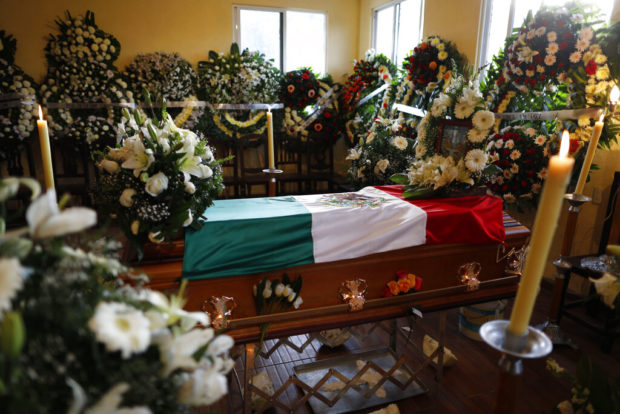
Flowers surround the flag-draped coffin of environmental activist Homero Gomez Gonzalez at his wake in Ocampo, Michoacan state, Mexico on Thursday. (AP)
OCAMPO, Mexico — Hundreds of farmers and agricultural workers thronged the funeral of activist Homero Gómez González on Friday, and the homage to him was like a tribute to the monarch butterfly he so staunchly defended.
The butterflies’ annual migration, threatened by logging, avocado farming and climate and environmental change, has also represented a ray of hope and income for the impoverished, pine-clad mountains of Michoacan state.
Nobody worked harder than Gómez González — whose body was found this week at the bottom of a holding pond with a head wound — to stop logging, reforest and bring tourists to the butterflies” wintering grounds.
In an area where crime, construction work and wood cutting provide some of the only sources of income, Gómez González provided a way out, ensuring income for the communal farmers who actually own the land in the butterfly reserve.
“Thanks to him many of you had work, or more work — those who sell food in the reserve, those who sell their handicrafts, those who bring their horses to carry visitors into the reserve.,” Rev. Saul Saucedo said in the funeral homily.
It may sound like low-wage jobs, but it is that tenuous economy that keeps the pine and fir trees from being cut down and preserves the butterflies’ marvelous migration from the United States and Canada each year.
It also feeds the family of communal farmer Raúl García González,.
“When there’s no work here, I go out and look for day labor jobs,” said the stringy, weather-beaten García González.
Like many of the communal land owners, he fears Gómez González’s death could add to the already bad reputation that drug cartel violence has given to the western state of Michoacan.
“We hope that all the people who come to the reserve will feel safe, because what happened to him was an accident,” the farmer said.
But the death was not so clear. Autopsy results showed Gómez González drowned in the holding pond after leaving a party Jan. 13, but they also showed he had a head wound.
There would have been no shortage of people for whom life would have been easier if Gómez González wasn’t around.
García recalled how, in 2019, Gómez González led hundreds of communal farmers in a demonstration in the nearby town of Angangueo to demand the town pay for water it receives from the mountain streams that are born on their properties.
They never got an answer.
While known as a friendly, big-hearted man who liked to pose for photographs surrounded by the swarms of black and orange butterflies that roost in trees here each winter, Gómez González was a leader and a community activist — a dangerous profession in Mexico, where dozens are killed each year.
Son Homero Gómez Valencia, 19, said his father could organize angry, resolute demonstrations, like the time he led farmers in taking over the state capitol building in the city of Morelia to demand development aid.
“He fought for his town, and that fills me with pride,” said Gómez Valencia. “A lot of the things we have are due to that struggle, which took many years. He fought against a thousand things.”
One of those enemies were illegal loggers, who threatened to punch gaps in the protective tree cover needed by the butterflies to survive winter chills. He then persuaded fellow farmers to replant cleared land with trees.
By local accounts, he managed to reforest about 150 hectares (370 acres) of previously cleared land.
“He taught us to be a united people,” his son said.
In Mexico, that can be a dangerous thing to do. London-based Global Witness counted 15 killings of environmental activists in Mexico in 2017 and 14 in 2018. In an October 2019 report, Amnesty International said 12 had been killed in the first nine months of that year.
“Something strange is happening, because they’re finishing off all the activists, the people who are doing something for society,” said Amado Gómez, the victim’s brother.
A few hours after the body was found on Wednesday, Michoacan state prosecutors said an initial review indicated a drowning and found no signs of trauma, but a statement Thursday night said more detailed autopsy results produced evidence of the head injury.
Authorities gave no other information on the injury and did not say how it might have been inflicted. They said an investigation continued, suggesting the case wasn’t considered an accident.
Prosecutors said robbery appeared not to be a potential motive, since almost $500 in cash was found on his body.
On Thursday night, mourners in threadbare clothes amid a few candles and simple floral arrangements underscored the tough struggle being played out in the nesting grounds, beset by grinding poverty and gang violence.
“I would like to ask the authorities to do their job and do more to protect activists like my brother, because lately in Mexico a lot of activists have died,” Amado Gómez said. “With his death, not only my family lost a loved one; but the whole world, and the monarch butterfly and the forests lost, too.”
President Andrés Manuel López Obrador described Gómez Gonzàlez’s death as “regrettable” and “painful” in remarks Thursday.